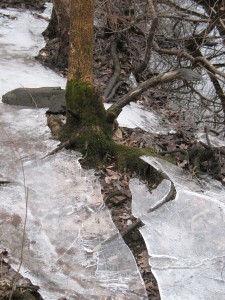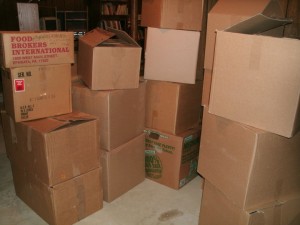Thaw – the thermal yo-yo rises. This morning the air is still and grey and the remaining snow looks like shucked-off clothing. Along the winter-black river, the ice that was edging out into the current has pulled back, and the ice-collars on the waterside trees drip drip drip.
Even Mt. Washington, where a few days back the wind-chill dropped below -50 degrees farenheit, is melting. I look at the water-thick air through the lens of one of the mountain observatory’s weather-cams – more grey; everything running downhill.
As happens to those whose 3rd-eye is turned always to the weather, I begin to wonder about this warmth, linking it reflexively with the daily stories of climate change, the warming that spreads out from our bodies and intent. And, as corrective, I remind myself again of the gulf between the immediate weather and the climate, that I would be a ninny to attribute daily variation to global shift.
And yet as a creature of the immediate, given global information, I can’t help but make this linkage. Perhaps that’s one reason why, as a sort of time-spanning outrigger, I read for balance a little each day from Thoreau’s journal. Right now, I’m following along through January, 1854, and the 159-year straddle across days brings me to this:
Jan. 13. Still warm and thawing, springlike; no freezing in the night, though high winds…These thawing days must have been to some extent lichen days too.
Yes, it’s January’s thaw, New England tradition, and in that year there are two within January’s first two weeks; and in this false spring, Thoreau is out and about, looking closely at what stirs and what is revealed. Just as in the middle of a snowstorm, we pay attention to the snow, its shapes and swirls, lose sight of what it covers, now we see what presents above it as it shrinks – the dark tree-bark, the tan grasses, the grey-green lichen, the junco gleaning seed, the black specks of snow fleas. I am drawn into the little lives of the day. And in this fascination, I am free for a while from my large, time-hopping mind’s global habits.
And you, what do you see when the snows recede?



